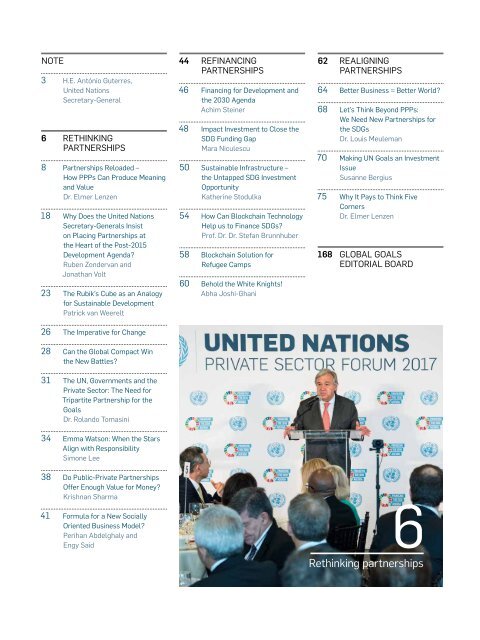Global Goals Yearbook 2018
The future of the United Nations is more uncertain than at any time before. Like his predecessors, UN Secretary General, Antonio Guterres, has promised to reform the United Nations. Drivers are two major agreements: The 2030 Agenda for Sustainable Development and the Paris Climate Accord. Both stand for a move away from statal top-down multilateralism towards new form of partnership between the public and the private sector as well as the civil society. The Global Goals Yearbook, published under the auspices of the macondo foundation, therefore covers „Partnership for the Goals“ as its 2018 main topic. Our world is truly not sustainable at this time. To make the 2030 Agenda for Sustainable Development a success story, we need an enormous increase in effort. This cannot happen without help from the private sector. But businesses need a reason to contribute as well as attractive partnerships that are based on win-win constellations. We have no alternative but to rethink the role that public–private partnerships can play in this effort. That is why United Nations Secretary-General António Guterres is calling upon UN entities to strengthen and better align their private-sector engagement. In every change there is a new chance. The Global Goals Yearbook 2018 discusses the multiple aspects of how private sector engagement can be improved. Recommendations are, among others, to revise multilaterism, partnership models and processes and to invest more in trust, a failure culture as well as metrics and monitoring. When businesses engage in partnerships for the Goals, this is more than just signing checks. It means inserting the “do good” imperative of the SDGs into corporate culture, business cases, innovation cycles, investor relationships, and, of course, the daily management processes and (extra-)financial reporting. The Yearbook includes arguments from academic and business experts, the World Bank and the Club of Rome as well as UN entities, among them UNDP, UNSSC, UNOPS, UN JIU, and UN DESA.
The future of the United Nations is more uncertain than at any time before. Like his predecessors, UN Secretary General, Antonio Guterres, has promised to reform the United Nations. Drivers are two major agreements: The 2030 Agenda for Sustainable Development and the Paris Climate Accord. Both stand for a move away from statal top-down multilateralism towards new form of partnership between the public and the private sector as well as the civil society. The Global Goals Yearbook, published under the auspices of the macondo foundation, therefore covers „Partnership for the Goals“ as its 2018 main topic.
Our world is truly not sustainable at this time. To make the 2030 Agenda for Sustainable Development a success story, we need an enormous increase in effort. This cannot happen without help from the private sector. But businesses need a reason to contribute as well as attractive partnerships that are based on win-win constellations.
We have no alternative but to rethink the role that public–private partnerships can play in this effort. That is why United Nations Secretary-General António Guterres is calling upon UN entities to strengthen and better align their private-sector engagement. In every change there is a new chance.
The Global Goals Yearbook 2018 discusses the multiple aspects of how private sector engagement can be improved. Recommendations are, among others, to revise multilaterism, partnership models and processes and to invest more in trust, a failure culture as well as metrics and monitoring.
When businesses engage in partnerships for the Goals, this is more than just signing checks. It means inserting the “do good” imperative of the SDGs into corporate culture, business cases, innovation cycles, investor relationships, and, of course, the daily management processes and (extra-)financial reporting.
The Yearbook includes arguments from academic and business experts, the World Bank and the Club of Rome as well as UN entities, among them UNDP, UNSSC, UNOPS, UN JIU, and UN DESA.
You also want an ePaper? Increase the reach of your titles
YUMPU automatically turns print PDFs into web optimized ePapers that Google loves.
NOTE<br />
3 H.E. António Guterres,<br />
United Nations<br />
Secretary-General<br />
6 RETHINKING<br />
PARTNERSHIPS<br />
8 Partnerships Reloaded –<br />
How PPPs Can Produce Meaning<br />
and Value<br />
Dr. Elmer Lenzen<br />
18 Why Does the United Nations<br />
Secretary-Generals Insist<br />
on Placing Partnerships at<br />
the Heart of the Post-2015<br />
Development Agenda?<br />
Ruben Zondervan and<br />
Jonathan Volt<br />
23 The Rubik’s Cube as an Analogy<br />
for Sustainable Development<br />
Patrick van Weerelt<br />
26 The Imperative for Change<br />
44 REFINANCING<br />
PARTNERSHIPS<br />
46 Financing for Development and<br />
the 2030 Agenda<br />
Achim Steiner<br />
48 Impact Investment to Close the<br />
SDG Funding Gap<br />
Mara Niculescu<br />
50 Sustainable Infrastructure –<br />
the Untapped SDG Investment<br />
Opportunity<br />
Katherine Stodulka<br />
54 How Can Blockchain Technology<br />
Help us to Finance SDGs?<br />
Prof. Dr. Dr. Stefan Brunnhuber<br />
58 Blockchain Solution for<br />
Refugee Camps<br />
60 Behold the White Knights!<br />
Abha Joshi-Ghani<br />
62 REALIGNING<br />
PARTNERSHIPS<br />
64 Better Business = Better World?<br />
68 Let’s Think Beyond PPPs:<br />
We Need New Partnerships for<br />
the SDGs<br />
Dr. Louis Meuleman<br />
70 Making UN <strong>Goals</strong> an Investment<br />
Issue<br />
Susanne Bergius<br />
75 Why It Pays to Think Five<br />
Corners<br />
Dr. Elmer Lenzen<br />
168 GLOBAL GOALS<br />
EDITORIAL BOARD<br />
28 Can the <strong>Global</strong> Compact Win<br />
the New Battles?<br />
31 The UN, Governments and the<br />
Private Sector: The Need for<br />
Tripartite Partnership for the<br />
<strong>Goals</strong><br />
Dr. Rolando Tomasini<br />
34 Emma Watson: When the Stars<br />
Align with Responsibility<br />
Simone Lee<br />
38 Do Public-Private Partnerships<br />
Offer Enough Value for Money?<br />
Krishnan Sharma3<br />
41 Formula for a New Socially<br />
Oriented Business Model?<br />
Perihan Abdelghaly and<br />
Engy Said<br />
6<br />
Rethinking partnerships

















